Updated January 24, 2017
#2.1-43
Пол Маккартни – CHOBA B CCCP (2-е издание – 13 песен)
Paul McCartney – CHOBA B CCCP (2nd edition – 13 tracks)
| Label (Company): |
|
||||
| Country: |
|
||||
| Format: |
|
||||
| Number of records: |
|
||||
| Catalogue number: |
|
||||
| Catalogue number of side 1: |
|
||||
| Catalogue number of side 2: |
|
||||
| Matrix number of side 1: |
|
||||
| Matrix number of side 2: |
|
||||
| Mono or Stereo: |
|
||||
| Rotation speed: |
|
||||
| First release date: |
|
Known combinations of matrix numbers endings:
Известные сочетания окончаний матричных номеров:
comb. 1 |
comb. 2 |
comb. 3 |
comb. 4 |
comb. 5 |
comb. 6 |
|
side 1 |
1-5 DMM |
1-5 DMM |
1-5 DMM |
1-5 DMM |
1-6 DMM |
1-6 DMM |
side 2 |
1-5 DMM |
1-6 DMM |
1-7 DMM |
1-8 DMM |
1-5 DMM |
1-7 DMM |
comb. 7 |
comb. 8 |
comb. 9 |
comb. 10 |
|||
side 1 |
1-6 DMM |
1-7 DMM |
1-7 DMM |
1-10 DMM |
||
side 2 |
1-8 DMM |
1-5 DMM |
1-7 DMM |
1-8 DMM |
|
side 1 |
|
|||
side 2 |
|
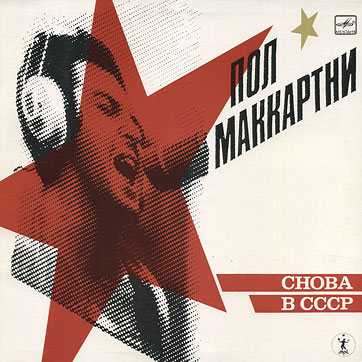 |
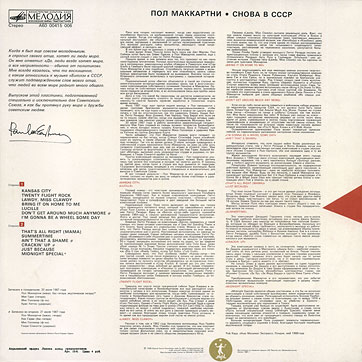 |
|
Sleeve, front side Обложка, лицевая сторона |
Sleeve, back side Обложка, оборотная сторона |
SIDE 1:
N |
Titles in Russian |
Time |
Comments |
1. |
Kansas City (Leiber-Stoller) | 4:01 |
All titles printed in English |
2. |
Twenty Flight Rock (Faichild-Cochran) | 3:02 |
|
3. |
Lawdy Miss Clawdy (Price) | 3:14 |
|
4. |
Bring It On Home To Me (Penniman-Collins) | 3:11 |
|
5. |
Lucille (Penniman-Collins) | 3:11 |
|
6. |
Don't Get Around Much Anymore (Ellington-Russell) | 2:49 |
|
7. |
I'm Gonna Be A Wheel Someday (Bartholomew-Hayes-Domino) | 4:12 |
SIDE 2:
N |
Titles in Russian |
Time |
Comments |
1. |
That's All Right (Mama) (Crudup) | 3:45 |
All titles printed in English |
2. |
Summertime (Gershwin) | 4:55 |
|
3. |
Ain't That A Shame (Domino-Bartholomew) | 3:42 |
|
4. |
Crackin' Up (McDaniel) | 3:53 |
|
5. |
Just Because (Shelton-Shelton-Robin) | 3:33 |
|
6. |
Midnight Special (Leadbetter-Lomax-Lomax) | 3:56 |
NOTE:
It's the 2nd edition of CHOBA B CCCP LP containing 13 tracks. Album title on the sleeve is displayed in Russian but not in English as many non-Russian-speaking collectors think, and is pronounced roughly as ′s-n-o-v-ah v ass-ass-ass-arr that means BACK IN THE USSR or AGAIN IN THE USSR.
Sometimes this record is referred to as THE RUSSIAN ALBUM by Paul McCartney. In 1991 these two words appeared on the official CD-edition as a sub-title. It should be noted that in the USSR there was no CD-edition. In Russia official CD-edition also has not been released yet.
Earlier the 1st edition of this album containing 11 tracks was released (with the same catalogue number). Also you can find mispressed editions with records containing 12 tracks (with the same catalogue number too).
If to compare this edition with the 1st one, it has two additional songs:
I'm Gonna Be A Wheel Someday – track # 7, the last on side 1,
Summertime – track # 2 on side 2.
Various US reference books show 24 December 1988 as the release date for the 2nd edition of this album. But You can find sleeves of the 1st edition by Riga Plant, which carry 1989. And the earliest of known sleeves by Leningrad Plant show "06.01.89г." which means January 6, 1989. At the same time it should be noted that these sleeves by Leningrad Plant have unusually big order number for the very beginning of the year – "1968" (even the sleeves by this Plant under the date of April 6, 1989 have the order # 213 only).
Possibly it tells that the decision to start the 2nd edition was really adopted in the end of 1988 and the order number for the first printing run of the sleeves by Leningrad Plant was given in the December of 1988. But not all Melodiya's manufacturing divisions started the 2nd edition at the same time.
Several noticeable and not very noticeable differences in design and annotation of the 1st and 2nd editions are described in the following table:
1st edition (11 songs) |
2nd edition (13 songs) |
||
Labels |
Tracklist |
in Russian |
in English |
Front |
MPL logo |
with no circle, |
inside the circle, |
Back |
Artist |
stated by large red letters |
stated by black font |
Position |
different |
||
Color of the background |
yellow |
white |
|
Author |
Андрей Гаврилов |
Рой Карр |
|
Tracklist |
in Russian and English |
in English |
|
Running time |
listed |
not listed |
|
Listing of |
listed for all tracks |
listed for each track |
|
List of |
general |
for each date of recording |
|
McCartney's signature |
name and surname are printed |
facsimile signature |
|
Authorship |
Майкл Росс |
Майкл Росс/Нормал Сервис |
|
MPL logo |
not listed |
listed |
|
Imprint |
in the right lower corner |
in the left lower corner |
|
Spine |
Text |
different font and different length of text [see Pic. 1] |
|
As it was already told in the description of the 1st edition, most likely in the beginning of 1989 during some period of time Melodiya released both editions simultaneously. Indirectly it is confirmed by the fact that You can find so-called "hybrid" issues (they were sold in record shops just so):
No. |
Sleeve |
Labels |
Vinyl |
|
Edition (number of tracks) |
|||
1 |
1st (11) |
1st (11) |
2nd (13) |
2 |
1st (11) |
2nd (13) |
1st (11) |
3 |
1st (11) |
2nd (13) |
2nd (13) |
4 |
2nd (13) |
1st (11) |
1st (11) |
5 |
2nd (13) |
1st (11) |
2nd (13) |
6 |
2nd (13) |
2nd (13) |
1st (11) |
In addition it should be noted that side 1 and side 2 of the record might have labels from different editions.
"Manufactured under license of EMI Records Ltd (Great Britain). 1987 recording" is stated on the sleeves and labels. Labels carry additional information about the type of recording – "(digital)".
But in the left lower part of the back side of the sleeve the following license information is listed – see Pic. 2.
Melodiya's name is printed as "Melodia".
There is one and only variation of the front side of the sleeve for this edition, apart from various color tints.
Most sleeves have the same article ("Арт. 15-6") and price ("4 руб.") listed.
Some collectors pay great attention to the color of the little star on the front side of the sleeve. On the sleeves of the 2nd edition it has various tints of different colors. It is very difficult to describe them exactly by words. But if to try to do it, it should be said that the little star can be of various tints of the following colors:
- yellow and golden-yellow,
- brown and golden-brown,
- grey and silver-grey,
- silver-green.
MPL logo on the back side of the sleeves is usually of the same color as the little star. But rarely the color (tint) of this logo differs slightly.
The back side of the sleeves by Riga Plant differs from the back side of the sleeves by other Melodiya's manufacturing divisions by the places of location of Melodiya's logo with the catalogue number and artist's name with the album title [see Pic. 3, 4].
MPL logo on the back side of most sleeves by Tashkent Plant is slightly rotated clockwise [see Pic. 5, 6].
And it seems that the back sides of the sleeves by each of Melodiya's manufacturing divisions have slightly different location of the red triangle in relation to the liner notes [see Pic. 7, 8, 9, 10, 11].
On the back side of the sleeve You can read a message from Paul McCartney to the Soviet people [see Pic. 12]. This message in English can be found in a booklet to the official CD-edition [see Pic. 12a]. Also the back side of the sleeve carries liner notes by Roy Carr. Authorship of the liner notes is listed as following: "Roy Carr. «New Musical Express», London, May, 1988". These liner notes in English (with additional information about CD bonus track) can be found in a booklet to the official CD-edition.
Spine of the sleeves by Riga Plant [see Pic. 13] differs from the spine by other Melodiya's manufacturing divisions [see Pic. 14] by means of presence of the part of the big red star's point.
You can find sleeves made (glued) different ways [see Pic. 15, 16]:
1) top and bottom edges are the part of the front side of the sleeve,
2) top and bottom edges are the part of the back side of the sleeve.
Sometimes these differences can be noticed when looking attentively at the upper or lower part of the front or back side of the sleeve.
Very often You can find sleeves, which carry shop's handwritten marks about reduction of the price on their back side. Sometimes these marks say about not once reduction – from 4 rub. to 3 rub. 60 kop. and later to 1 rub. [see Pic. 17]. It can be said that LPs, which have sleeves with reduction marks, were bought in the beginning of 90s.
You can find sleeves made of thick paper (thin cardboard) of different quality.
The writer of these notes found in his private archive the press cutting from the January 18, 1990 issue of МК (Moskovskij Komsomolets) newspaper where it is stated that in the list of the most popular records with the recordings of variety music pieces of 1989 (in the hit parade of TASS) this album was the second [see Pic. 18]. TASS means Telegraph Agency of the Soviet Union; variety music means pop/easy listening music.
Melodiya, which released trimonthly catalogue-bulletins, in # 3 (July-September) 1990 on page 37 featured a little article titled GOLD DISC where reported about awarding Paul McCartney a corresponding prize for maximum printing quota of CHOBA B CCCP album [see Pic. 19].
In turn, on February 11, 1990, Soviet newspaper Komsomolskaya Pravda stated: "Since the contract was signed and till January 1, 1990, more than 400,000 copies of the album were manufactured and sold in the USSR. In the UK, artists selling more than this number of albums are awarded a symbolic Gold Record by the British record industry. Melodiya honoured McCartney with a gold disc at a ceremony at Wembley, London's prestigious concert venue, on January 26, 1990 at 19.00 GMT. The Melodiya VTPO gold disc was presented to the singer by Victor Alexandrovich Solomatin, the company's deputy executive director for creative affairs. McCartney looked somewhat surprised as the Soviet executive delivered his speech in fluent English. The three-hour concert that followed confirmed that old Macca could still fire on all four cylinders (not bad for a 47-year-old!)". Also the article stated: "McCartney responded positively to Melodiya's proposal to round off his world concert tour in the USSR. Talks to make the necessary arrangements will be held with his manager in the near future". As we know there was no such a concert.
For the other details see the corresponding Plant (Recording Studio) pages of this edition. This page doesn't display the following label images:
– Baku Plant – was closed approx. in 1971,
– All-Union Recording Studio – in April of 1978 production capacities of this Studio were renamed to Moscow Experimental Recording Plant,
– Moscow Experimental Recording Plant – was turned to manufacture CDs approx. in 1989-1990.
For additional information refer to the main page of CHOBA B CCCP (1st edition) and to the main page of CHOBA B CCCP (mispressed edition).
Official vinyl edition of this album was released in the USSR only. Outside the Soviet Union counterfeit LP-edition containing 13 tracks (var. 1) was released. Sleeve for this LP [see Pic. 20] was copied from the original 2nd edition by Aprelevka plant – correspondingly with the correct catalogue number. But the little star on the front side has a right lower point of a less size. And the red triangle on the back side seems to be located in a slightly different place in relation to the liner notes (if to compare with the very original by Aprelevka Plant). As well it can be added that counterfeit sleeve doesn't carry the license information on the left hand of MPL logo [see Pic. 21], and single underlining marks of red color can be seen below several song titles [see Pic. 22]. Also spine text is differs from the spine text of the original edition: it is printed by different font and has mistakes in the ending of catalogue number and Paul's second name [Pic. 23].
Yellow labels [see Pic. 24] carry number V-83, which is different from the original Melodiya's catalogue number. Some lettering on the labels is printed in English in those places, where Melodiya had it always in Russian. The LP itself carries the following handwritten matrix numbers:
on side 1 – V–8–3– A,
on side 2 – V–83–B.
Also it should be noted that some text in a deadwax is scratched over carefully.
It was managed to find one more variation of the counterfeit LP-edition containing 13 tracks (var. 2). Sleeve for this LP [see Pic. 25] was also copied from the original 2nd edition by Aprelevka plant – correspondingly with the correct catalogue number. But the little star on the front side has the same color as the big star – raspberry-red. The back side of this counterfeit sleeve at the left from MPL logo shows no license information and MPL logo itself is in black [see Pic. 26]. The spine is blank (no text) [see Pic. 27].
White labels were also copied from LP by Aprelevka Plant but a part of text (including the catalogue numbers) was removed [see Pic. 28]. This edition carries the following handwritten matrix numbers:
on side 1 – CP-1,
on side 2 – CP-2.
In November 2016 information about third counterfeit LP-edition containing 13 tracks (var. 3) was discovered [see Pic. 29].
McCartney fans outside the Soviet Union were still able to buy original album "officially". In 1989 English WINGS FUN CLUB had purchased from Melodiya a limited quantity of LPs of the 2nd edition and was distributing records among its members from various countries according to their orders. Pic. 30 shows the postal package in which LP arrived to one of Paul McCartney female fans in West Germany (Federal Republic of Germany). According to the postal stamp, the packet was dispatched from England on July 24, 1989. The record was supplied with a special edition of Club Sandwich magazine (No. 51 SPRING 1989) as a double-sided sheet of paper [see Pic. 31], which said: "So what you hold is the genuine Russian article, part of unique limited edition". Actually the LP was an absolutely usual variation released by Aprelevka Plant – with the sleeve of var. 1 (and var. A of its back side) and with labels of var. white-1. Also the editorial by Sue had several other mistakes.
Pic. 32 shows a photograph of receipt which is a proof of purchase of another copy of CHOBA B CCCP LP (stated as RUSSIAN ALBUM) from "WINGS FUN CLUB" – this record was dispatched on September 18, 1989 to British Paul McCartney's fan. The contents of the packet were the same: the Soviet LP and a special edition of Club Sandwich magazine (No. 51 SPRING 1989). Postal package was also absolutely identic. But this time though the record by Aprelevka Plant had labels of var. white-1, it was supplied with the sleeve of var. 1 with var. C of its back side (export variation).
In 1991 outside the Soviet Union the CD-version containing tracks from this LP was released [see Pic. 33]. It included additional the fourteenth track – I'm In Love Again (as track # 4). CD has a very odd title containing English and Russian characters: PAUL McCARTИEЧ CHOBA Б CCCP (The Russian Album). Of course You can recognize the real album title.
Also Sergey Gribushin tells about this album (and its different variations) in his article BRITISH INVASION (14), published on November 30, 1995 in Russian newspaper Glavniy Prospect of Yekaterinburg city [see Pic. 34].
In 2017 the article from the newspaper Sovetskaya kultura (means The Soviet culture) dated July 15, 1989 was found, where representative of Melodiya explained existence of two variations of LP CHOBA B CCCP [see Pic. 35]. The translation is below:
READER ASKS
A QUESTION
A MYSTERY
OF TWO
RECORDS
I bought the record of Paul McCartney's «Снова в СССР». After a while I saw it again on a shop counter and could not resist of buying it again. For good reason! It turned out that there are 11 songs on the first record, released on September 14, 1988, and the second one which was released on January 1, 1989, carried 13 songs. What a mystery?
A. Bogdanov.
Severodvinsk,
Arhangelsk region
With the request to clarify this mysterious story, we asked the chief editor, Deputy Director of the All-Union Recording Studio of "«Melodiya» Firm" All-Union Creative-Production Association, Ivan Dmitrievich Nesvit:
— First of all I want to say that your reader is lucky. Why? Just how you will soon understand for yourself. According to the contract, this licensed disk should have consisted of 13 songs, and a special contract clause stipulated that the artist's desires would be accepted in the design of the sleeve. However, «Mezhdunarodnaya kniga» (our intermediator) provided us with a tape with eleven songs. The recording fit with the Soviet State Standard in terms of running time and so we began working with it. According to the requirements of the contract, a test record and sleeve were sent to Mr McCartney. He studied them and made a few remarks. Although Leningrad Plant had already started pressing and distributing copies, we could not ignore these remarks. Corrections were therefore made to the design, the initial sleeve notes were replaced, and besides this we were sent the recordings of two more songs to include. For this reason the extended record plays longer than any domestic disc. And so two records with the same title appeared. By the way, the first record because of its "shamefulness" appearance and limited edition became a rarity desirable for record collectors, especially abroad since it was intended for sale only in our country. As far as we know, in the USA and Europe 200-250 dollars were paid for this record. So the reader of «Sovetskaya kultura» became the owner of discophile rarity.
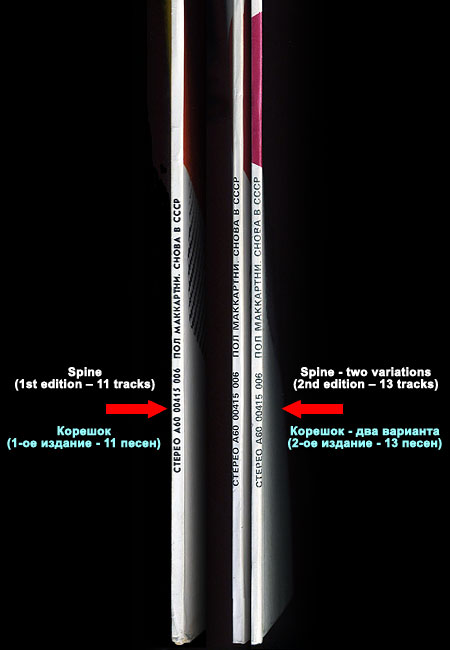
Pic. 1. Comparison of spines of the 1st and 2nd editions
Рис. 1. Сравнение корешков 1-го и 2-го изданий

Pic. 2. Fragment of the back side of the sleeve (left lower part) carrying the license information
Рис. 2. Фрагмент оборотной стороны обложки (левая нижняя часть) с информацией о лицензии

Pic. 3. Fragment of the back side of the sleeve (upper part) showing the places of location of Melodiya's logo with catalogue number and artist's name with the album title – Riga Plant
Рис. 3. Фрагмент оборотной стороны обложки (верхняя часть), показывающий места расположения логотипа фирмы "Мелодия" с каталожным номером и имени исполнителя с названием альбома – Рижский завод

Pic. 4. Fragment of the back side of the sleeve (upper part) showing the places of location of Melodiya's logo with catalogue number and artist's name with the album title – other Melodiya's manufacturing divisions (Aprelevka Plant as an example)
Рис. 4. Фрагмент оборотной стороны обложки (верхняя часть), показывающий места расположения логотипа фирмы "Мелодия" с каталожным номером и имени исполнителя с названием альбома – другие производственные подразделения фирмы "Мелодия" (на примере Апрелевского завода)
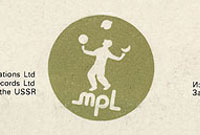 |
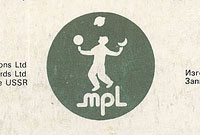 |
|
Pic. 5. Fragment of the back side of the sleeve Рис. 5. Фрагмент оборотной стороны обложки |
Pic. 6. Fragment of the back side of the sleeve Рис. 6. Фрагмент оборотной стороны обложки |

Pic. 7. Fragment of the back side of the sleeve (middle part) showing the location of the red triangle in relation to the liner notes – Aprelevka Plant
Рис. 7. Фрагмент оборотной стороны обложки (средняя часть), показывающий расположение красного треугольника относительно пояснительного текста – Апрелевский завод

Pic. 8. Fragment of the back side of the sleeve (middle part) showing the location of the red triangle in relation to the liner notes – Leningrad Plant
Рис. 8. Фрагмент оборотной стороны обложки (средняя часть), показывающий расположение красного треугольника относительно пояснительного текста – Ленинградский завод

Pic. 9. Fragment of the back side of the sleeve (middle part) showing the location of the red triangle in relation to the liner notes – Riga Plant
Рис. 9. Фрагмент оборотной стороны обложки (средняя часть), показывающий расположение красного треугольника относительно пояснительного текста – Рижский завод

Pic. 10. Fragment of the back side of the sleeve (middle part) showing the location of the red triangle in relation to the liner notes – Tashkent Plant
Рис. 10. Фрагмент оборотной стороны обложки (средняя часть), показывающий расположение красного треугольника относительно пояснительного текста – Ташкентский завод

Pic. 11. Fragment of the back side of the sleeve (middle part) showing the location of the red triangle in relation to the liner notes – Tbilisi Recording Studio
Рис. 11. Фрагмент оборотной стороны обложки (средняя часть), показывающий расположение красного треугольника относительно пояснительного текста – Тбилисская студия грамзаписи
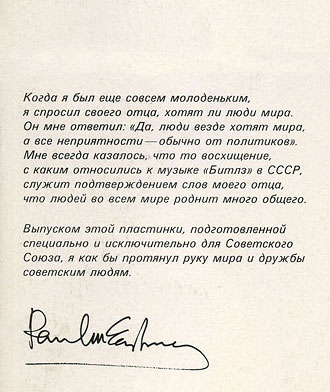 |
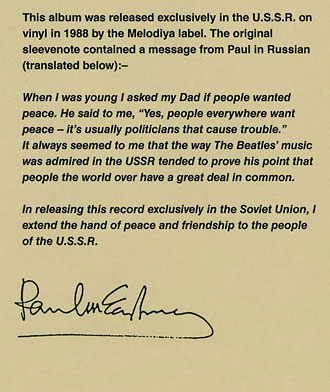 |
|
Pic. 12. Fragment of the back side of the sleeve Рис. 2. Фрагмент оборотной стороны обложки |
Pic. 12a. Fragment of one page of the booklet Рис. 2а. Фрагмент одной из страниц буклета |
Riga 51
![]()
Pic. 13. Spine variation of the sleeves by Riga Plant – the front side of the sleeve up
Рис. 13. Вариант корешка у обложек Рижского завода – обложка расположена лицевой стороной вверх
Aprelevka 1
![]()
Pic. 14. Spine variation of the sleeves by other Melodiya's manufacturing divisions – the front side of the sleeve up
Рис. 14. Вариант корешка у обложек других производственных подразделений фирмы "Мелодия" – обложка расположена лицевой стороной вверх

Pic. 15. Top edges of the sleeves made different ways
Рис. 15. Верхние рёбра по-разному склеенных обложек

Pic. 16. Bottom edges of the sleeves made different ways
Рис. 16. Нижние рёбра по-разному склеенных обложек
АЗГ 10 and АЗГ 2
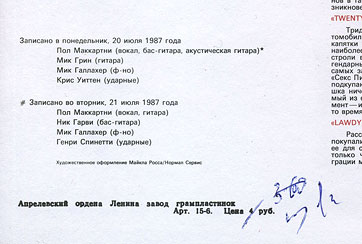
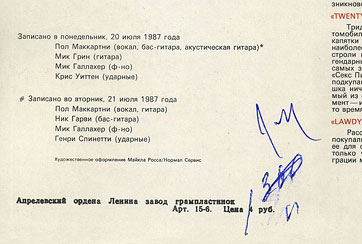
АЗГ 6
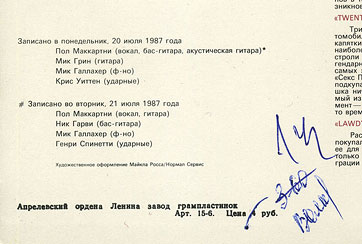
Pic. 17. Fragments of the back side of the sleeves (left lower corner) carrying shop's handwritten marks about reduction of the price
Рис. 17. Фрагменты оборотной стороны обложек (левый нижний угол), на которых видны рукописные пометки магазина об уценке

Pic. 18. Fragment of the 18 January 1990 issue of МК newspaper featuring top lines of the 1989 hit parade of TASS
Рис. 18. Фрагмент газеты "МК" за 18 января 1990 года с верхними строчками хит-парада ТАСС за 1989 год
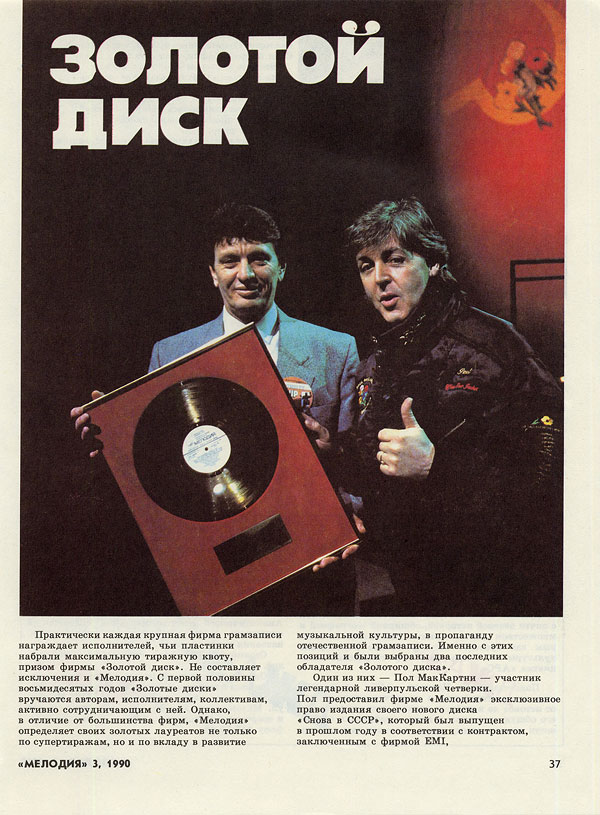
Pic. 19. Page 37 of Melodiya 3, 1990 catalogue-bulletin featuring GOLD DISC article
Рис. 19. Страница 37 из каталога-бюллетеня "Мелодия" 3, 1990 с заметкой "ЗОЛОТОЙ ДИСК"
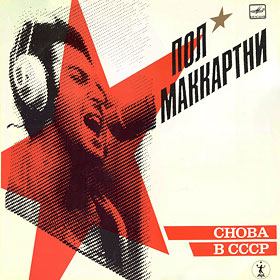
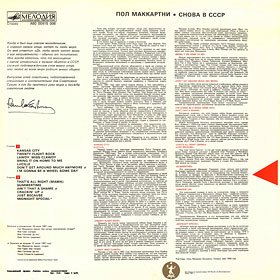
Pic. 20. CHOBA B CCCP counterfeit vinyl edition (var. 1) – sleeve, front and back sides
Рис. 20. Виниловое издание-подделка CHOBA B CCCP (вар. 1) – обложка, лицевая и оборотная стороны

Pic. 21. CHOBA B CCCP counterfeit vinyl edition (var. 1) – fragment of the back side of the sleeve (central lower part) not carrying the license information
Рис. 21. Виниловое издание-подделка CHOBA B CCCP (вар. 1) – фрагмент оборотной стороны обложки (центральная нижняя часть), где информация о лицензии отсутствует
![]()
![]()
![]()
Pic. 22. CHOBA B CCCP counterfeit vinyl edition (var. 1) – fragments of the back side of the sleeve where single underlining marks of red color can be seen below several song titles
Рис. 22. Виниловое издание-подделка CHOBA B CCCP (вар. 1) – фрагменты оборотной стороны обложки, где под некоторыми названиями песен видны отдельные знаки подчёркивания красного цвета
![]()
Pic. 23. CHOBA B CCCP counterfeit vinyl edition (var. 1) – spine (the front side of the sleeve up)
Рис. 23. Виниловое издание-подделка CHOBA B CCCP (вар. 1) – корешок (обложка расположена лицевой стороной вверх)
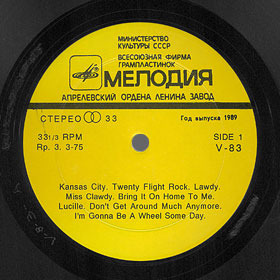
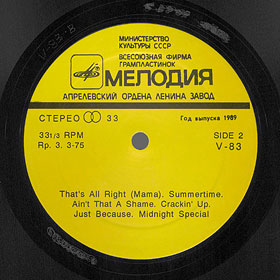
Pic. 24. CHOBA B CCCP counterfeit vinyl edition (var. 1) – matrix numbers and labels, side 1 and side 2
Рис. 24. Виниловое издание-подделка CHOBA B CCCP (вар. 1) – матричные номера и этикетки, сторона 1 и сторона 2
cheslovasS1-1 / cheslovasS1-2
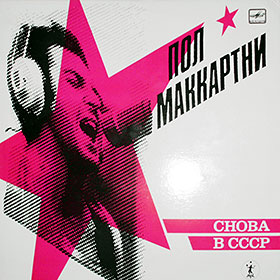
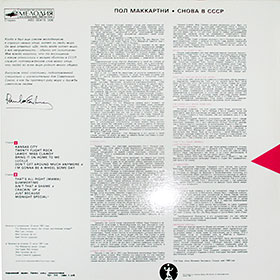
Pic. 25. CHOBA B CCCP counterfeit vinyl edition (var. 2) – sleeve, front and back sides
Рис. 25. Виниловое издание-подделка CHOBA B CCCP (вар. 2) – обложка, лицевая и оборотная стороны
cheslovasS1-2

Pic. 26. CHOBA B CCCP counterfeit vinyl edition (var. 2) – fragment of the back side of the sleeve (central lower part) not carrying the license information
Рис. 26. Виниловое издание-подделка CHOBA B CCCP (вар. 2) – фрагмент оборотной стороны обложки (центральная нижняя часть), где информация о лицензии отсутствует
cheslovas1
![]()
Pic. 27. CHOBA B CCCP counterfeit vinyl edition (var. 2) – blank spine (the front side of the sleeve up)
Рис. 27. Виниловое издание-подделка CHOBA B CCCP (вар. 2) – корешок без текста (обложка расположена лицевой стороной вверх)
cheslovasL1-1 / cheslovasL1-2
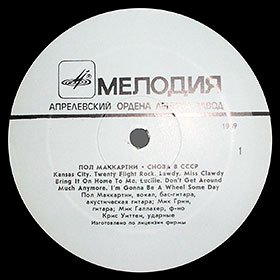
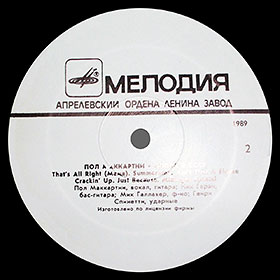
Pic. 28. CHOBA B CCCP counterfeit vinyl edition (var. 2) – labels, side 1 and side 2
Рис. 28. Виниловое издание-подделка CHOBA B CCCP (вар. 2) – этикетки, сторона 1 и сторона 2
japan1-1 / japan1-2
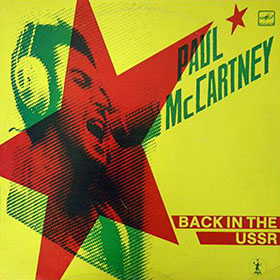
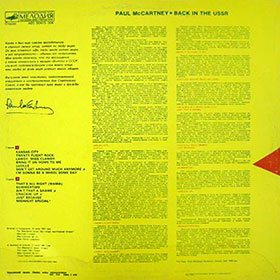
japan1-1 / japan1-2
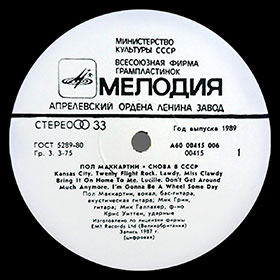
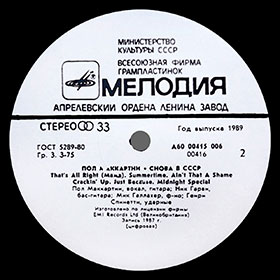
Pic. 29. CHOBA B CCCP counterfeit vinyl edition (var. 3) – sleeve and labels
Рис. 29. Виниловое издание-подделка CHOBA B CCCP (вар. 3) – обложка и этикетки
markus
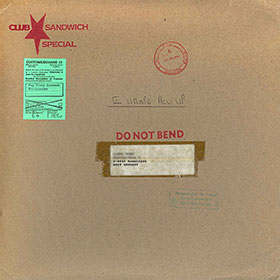
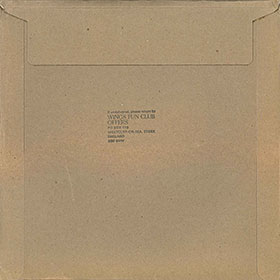
Pic. 30. Postal package in which CHOBA B CCCP LP arrived to one of Paul McCartney female fans in West Germany (Federal Republic of Germany)
[Click on image to enlarge]
Рис. 30. Почтовая упаковка, в которой пластинка CHOBA B CCCP прибыла к одной из поклонниц Пола Маккартни в Западной Германии (ФРГ)
[Щёлкните на картинку для её увеличения]
markus
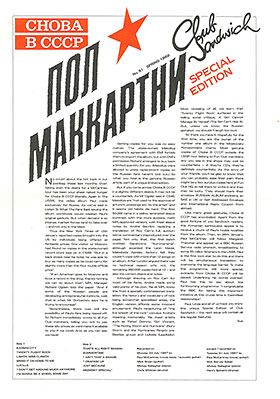
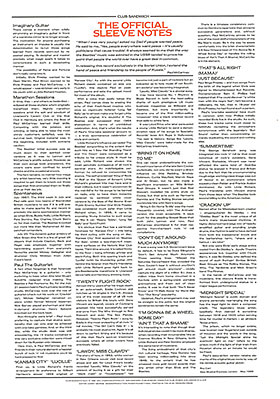
Pic. 31. Special edition of Club Sandwich magazine (No. 51 SPRING 1989)
[Click on image to read]
Рис. 31. Специальный выпуск клубного журнала "Club Sandwich" (№ 51, весна 1989 года)
[Чтобы прочитать, кликните на изображение]
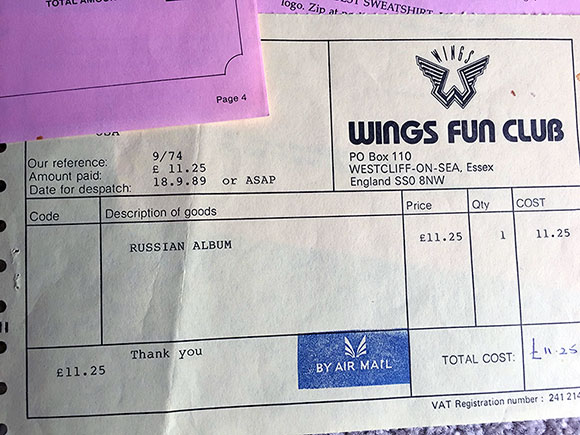
Pic. 32. A receipt (dated by September 18, 1989) which is a proof of purchase of CHOBA B CCCP LP (stated as RUSSIAN ALBUM) from "WINGS FUN CLUB"
Рис. 32. Платёжная квитанция (от 18 сентября 1989 года), подтверждающая покупку пластинки СНОВА В СССР (указана как РУССКИЙ АЛЬБОМ) у "WINGS FUN CLUB"
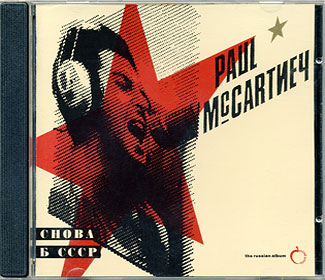
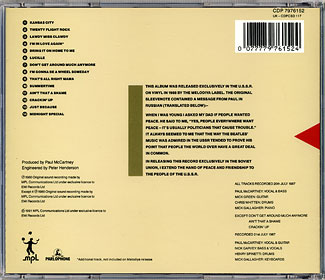
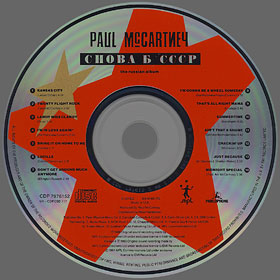
Pic. 33. CD-version of CHOBA B CCCP album
Рис. 33. Издание альбома CHOBA B CCCP на компакт-диске
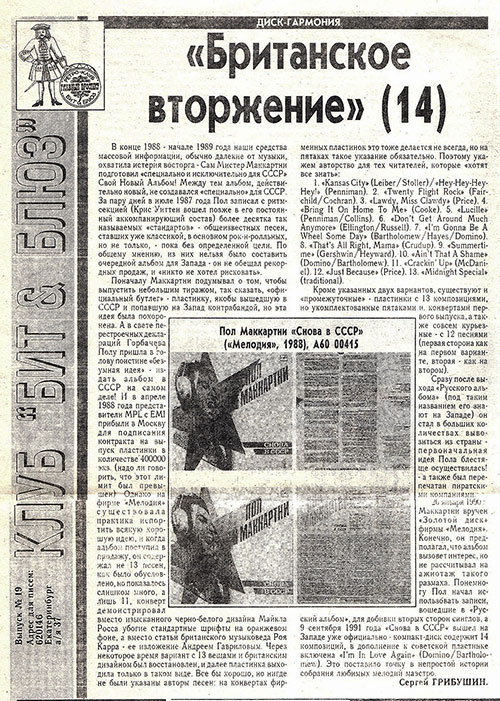
Pic. 34. The article BRITISH INVASION (14) by Sergey Gribushin, published on November 30, 1995
in Russian newspaper Glavniy Prospect of Yekaterinburg city
[Click on image to read the article]
Рис. 34. Статья Сергея Грибушина "БРИТАНСКОЕ ВТОРЖЕНИЕ" (11), опубликованная
в российской газете "Главный проспект" (г. Екатеринбург) 30 ноября 1995 года
[Чтобы прочитать статью, кликните на изображение]

Pic. 35. The article A MYSTERY OF TWO RECORDS, published on July 15, 1989
in the newspaper Sovetskaya kultura
[Click on image to read the article]
Рис. 35. Статья "ЗАГАДКА ДВУХ ПЛАСТИНОК", опубликованная
в газете "Советская культура" 15 июля 1989 года
[Чтобы прочитать статью, кликните на изображение]
ПРИМЕЧАНИЕ:
Это - 2-е издание пластинки СНОВА В СССР, содержащее 13 песен. Название альбома на обложке указано на русском, а не английском языке, как думают многие нерусскоязычные коллекционеры.
Иногда эту пластинку представляют как РУССКИЙ АЛЬБОМ Пола Маккартни. В 1991 году два этих слова появились на официальном CD-издании в виде второго названия. Следует отметить, что в СССР компакт-диск не издавался. Также и в России до сих пор не было официального издания этого компакт-диска.
Ранее было выпущено 1-е издание этого альбома (с тем же каталожным номером), содержащее 11 песен. Также можно встретить бракованные издания, пластинки которых содержат 12 песен (и тоже с тем же каталожным номером).
Если сравнивать это издание с 1-м, то на нём появились две дополнительные песни:
I'm Gonna Be A Wheel Someday – композиция № 7, последняя на стороне 1,
Summertime – композиция № 2 на стороне 2.
Многие американские справочники датой выпуска 2-го издания этого альбома называют 24 декабря 1988 года. Но известны обложки 1-го издания Рижского завода, на которых указан 1989 год. А самые ранние из известных обложек Ленинградского завода имеет дату "06.01.89г.", что означает 6 января 1989 года. В то же время следует отметить, что эти обложки Ленинградского завода имеют необычно большой порядковый номер заказа для самого начала года – "1968" (даже обложки этого завода, датированные 6-м апреля 1989 года, имеют заказ всего лишь № 213).
Это может говорить о том, что решение о начале выпуска 2-го издания действительно было принято в конце 1988 года, и номер заказа для первого тиража обложек Ленинградского завода был присвоен в декабре 1988 года. Но не все производственные подразделения фирмы "Мелодия" приступили к выпуску 2-го издания одновременно.
Некоторые заметные и не очень заметные отличия в оформлении и аннотации 1-го и 2-го изданий представлены в следующей таблице:
1-е издание (11 песен) |
2-е издание (13 песен) |
||
Этикетки |
Перечень песен |
на русском языке |
на английском языке |
Лицевая |
Логотип MPL |
без круга, |
внутри круга, |
Оборотная |
Исполнитель |
указан большими красными буквами |
указан чёрным шрифтом |
Расположение |
разное |
||
Цвет фона |
жёлтый |
белый |
|
Автор |
Андрей Гаврилов |
Рой Карр |
|
Перечень песен |
на русском и |
на английском языке |
|
Продолжительность |
указана |
не указана |
|
Указание дат записи |
указано для всех песен |
указано для каждой песни |
|
Перечень |
общий |
по датам записи |
|
Подпись Маккартни |
имя и фамилия набраны |
факсимильная подпись |
|
Авторство |
Майкл Росс |
Майкл Росс/Нормал Сервис |
|
Логотип MPL |
отсутствует |
имеется |
|
Выходные данные |
в правом нижнем углу |
в левом нижнем углу |
|
Корешок |
Текст |
разный шрифт и разная длина надписи [см. Рис. 1] |
|
Как уже было сказано в описании 1-го издания, скорей всего, в начале 1989 года на протяжении некоторого времени фирма "Мелодия" выпускала оба издания одновременно. Косвенно это подтверждается тем, что иногда можно встретить так называемые "гибридные" выпуски (именно в таком виде они продавались в магазинах):
|
№ |
Обложка |
Этикетки |
Винил |
|
Издание (количество дорожек) |
|||
1 |
1-е (11) |
1-е (11) |
2-е (13) |
2 |
1-е (11) |
2-е (13) |
1-е (11) |
3 |
1-е (11) |
2-е (13) |
2-е (13) |
4 |
2-е (13) |
1-е (11) |
1-е (11) |
5 |
2-е (13) |
1-е (11) |
2-е (13) |
6 |
2-е (13) |
2-е (13) |
1-е (11) |
В дополнение следует отметить, что на стороне 1 и стороне 2 пластинки могут быть этикетки от разных изданий.
На обложках и этикетках указано: "Изготовлено по лицензии фирмы EMI Records Ltd (Великобритания). Запись 1987 г.". На этикетках указана дополнительная информация о типе записи – "(цифровая)".
А в левой нижней части оборотной стороны обложки указана следующая информация о лицензии – см. Рис. 2.
Название фирмы "Мелодия" латиницей указано как "Melodia".
Существует один единственный вариант лицевой стороны обложки этого издания, не считая различных цветовых оттенков.
На большинстве обложек указаны одни и те же артикул ("Арт. 15-6") и цена ("4 руб.").
Некоторые коллекционеры уделяют большое внимание цвету маленькой звезды на лицевой стороне обложки. На обложках 2-го издания эта звезда имеет различные оттенки разных цветов. Очень трудно их точно описать словами. Но если постараться это сделать, то следует сказать, что маленькая звезда может иметь различные оттенки следующих цветов:
- жёлтого и золотисто-жёлтого,
- коричневого и золотисто-коричневого,
- серого и серебристо-серого,
- серебристо-зелёного.
Логотип MPL на оборотной стороне обложек обычно имеет тот же цвет, что и маленькая звезда. Но в редких случаях цвет (оттенок) этого логотипа немного отличается.
Оборотная сторона обложек Рижского завода отличается от оборотной стороны обложек других производственных подразделений фирмы "Мелодия" местами расположения её логотипа с каталожным номером и имени исполнителя с названием альбома [см. Рис. 3, 4].
На оборотной стороне большинства обложек Ташкентского завода логотип MPL немного повёрнут по часовой стрелке [см. Рис. 5, 6].
И, похоже, оборотные стороны обложек каждого из производственных подразделений фирмы "Мелодия" имеют немного различное расположение красного треугольника относительно пояснительного текста [см. Рис. 7, 8, 9, 10, 11].
На оборотной стороне обложки можно прочитать послание Пола Маккартни к советским людям [см. Рис. 12]. Текст данного послания на английском языке можно найти в буклете к официальному CD-изданию [см. Рис. 12а]. Также на оборотной стороне обложки имеется пояснительный текст Роя Карра. Авторство текста указано следующим образом: "Рой Карр. «Нью Мюзикал Экспресс», Лондон, май 1988 года". Данный пояснительный текст на английском языке (с дополнительной информацией о бонус-треке с компакт-диска) можно найти в буклете к официальному CD-изданию.
Корешок у обложек Рижского завода [см. Рис. 13] отличается от корешка у обложек других производственных подразделений фирмы "Мелодия" [см. Рис. 14] тем, что на нём видна часть одного из лучей большой красной звезды.
Можно встретить по-разному склеенные обложки [см. Рис. 15, 16]:
1) верхнее и нижнее рёбра являются частью (продолжением) лицевой стороны обложки,
2) верхнее и нижнее рёбра являются частью (продолжением) оборотной стороны обложки.
Иногда эти различия можно заметить при внимательном взгляде на верхнюю или нижнюю часть лицевой или оборотной стороны обложки.
Довольно часто попадаются обложки, на оборотной стороне которых видны рукописные пометки магазина об уценке товара. Иногда эти пометки говорят о неоднократных уценках – с 4 руб. до 3 руб. 60 коп., а затем до 1 руб. [см. Рис. 17]. Про пластинки в обложках, на которых указана уценка, можно сказать то, что они были куплены в начале 90-х годов.
Можно встретить обложки, выполненные из плотной бумаги (тонкого картона) различного качества.
Автор этих строк нашёл в своём личном архиве газетную вырезку из газеты "МК" ("Московский комсомолец") за 18 января 1990 года, где указано, что в списке самых популярных пластинок с записью эстрадных произведений за 1989 год (в хит-параде ТАСС) этот альбом занял 2-е место [см. Рис. 18]. ТАСС – это Телеграфное агентство Советского Союза.
Фирма "Мелодия", выпускавшая ежеквартальные каталоги-бюллетени, в № 3 (июль-сентябрь) 1990 года на странице 37 опубликовала небольшую заметку под названием "ЗОЛОТОЙ ДИСК", в которой сообщила о награждении Пола Маккартни соответствующим призом за максимальную тиражную квоту альбома СНОВА В СССР [см. Рис. 19].
В свою очередь, советская газета "Комсомольская правда" в номере за 11 февраля 1990 года сообщала: "С момента подписания контракта на 1.01.90 года в СССР было выпущено и реализовано более 400 тысяч экземпляров пластинки. По существующей в Великобритании традиции это рубеж вручения исполнителю символического «Золотого диска». Церемония награждения Пола Маккартни состоялась 26 января 1990 года в 19 часов по Гринвичу на сцене престижного лондонского концертного зала «Уэмбли Арена». «Золотой диск» ВТПО «Фирма Мелодия» вручил заместитель генерального директора фирмы по творческим вопросам Виктор Александрович Соломатин. Юбиляр с некоторым удивлением выслушал спич советского гостя на чистом английском языке. Состоявшийся затем 3-часовой концерт подтвердил, что «есть ещё порох в пороховницах» у старины Макка (47 лет – не шутка!)". Также в заметке говорилось: "Господин Маккартни положительно отреагировал на предложение «Фирмы Мелодия» завершить мировое турне концертом в СССР. В ближайшее время будут проведены переговоры с его менеджером по этому вопросу". Как известно, такой концерт не состоялся.
Другие подробности этого издания можно увидеть на страницах соответствующего завода (студии грамзаписи). На данной странице не представлены следующие заставки-этикетки:
– Бакинский завод – был закрыт примерно в 1971 году,
– Всесоюзная студия грамзаписи (ВСГ) - в апреле 1978 года производственные мощности этой студии были переименованы в Московский опытный завод "Грамзапись",
– Московский опытный завод "Грамзапись" – был переведён на производство компакт-дисков примерно в 1989-1990 году.
Дополнительную информацию смотрите на главной странице CHOBA B CCCP (1-е издание) и на главной странице CHOBA B CCCP (издание-опечатка).
Официально на виниле этот альбом был выпущен только в СССР. За пределами Советского Союза был выпущено издание-подделка с 13-ю композициями (вар. 1). Обложка для этой пластинки [см. Рис. 20] была скопирована с оригинала обложки 2-го издания Апрелевского завода – соответственно, с правильным каталожным номером. Но на лицевой стороне у маленькой звезды правый нижний луч меньшего размера. А на оборотной стороне красный треугольник, похоже, находится немного в другом месте относительно пояснительного текста (если сравнивать с оригиналом обложки именно Апрелевского завода). Ещё можно добавить, что на оборотной стороне обложки-подделки слева от логотипа MPL отсутствует информация о лицензии [см. Рис. 21], и под некоторыми названиями песен видны отдельные знаки подчёркивания красного цвета [см. Рис. 22]. Также и надписи на корешке обложки отличаются от надписей на оригинале: как шрифтом, так и наличием опечаток в окончании каталожного номера и в фамилии Пола [см. Рис. 23].
На жёлтых этикетках [см. Рис. 24] указан номер V-83, который отличается от каталожного номера фирмы "Мелодия". Некоторые надписи на этикетках указаны на английском языке в тех местах, где у фирмы "Мелодия" они были всегда на русском. Сама пластинка имеет следующие "рукописные" матричные номера:
на стороне 1 – V–8–3– A,
на стороне 2 – V–83–B.
Также следует заметить, что какой-то текст на "зеркале" винила тщательно зацарапан.
Удалось найти и ещё один вариант издания-подделки с 13-ю композициями (вар. 2). Обложка для этой пластинки [см. Рис. 25] была также скопирована с оригинала обложки 2-го издания Апрелевского завода – соответственно, с правильным каталожным номером. Но на лицевой стороне маленькая звезда имеет тот же цвет, что и большая, – малиновый. На оборотной стороне этой обложки-подделки слева от логотипа MPL также отсутствует информация о лицензии, а сам логотип MPL имеет чёрный цвет [см. Рис. 26]. На корешке обложки какой-либо текст отсутствует [см. Рис. 27].
Белые этикетки тоже скопированы с пластинки Апрелевского завода, но часть текста (в том числе и каталожные номера) убрана [см. Рис. 28]. Это издание имеет следующие "рукописные" матричные номера:
на стороне 1 – CP-1,
на стороне 2 – CP-2.
В ноябре 2016 года была обнаружена информация о третьем издании-подделке с 13-ю композициями (вар. 3) [см. Рис. 29].
Поклонники Пола Маккартни за пределами Советского Союза всё же могли приобрести оригинальный альбом "официально". В 1989 году английский "WINGS FUN CLUB" приобрёл у фирмы "Мелодия" ограниченное количество экземпляров 2-го издания и рассылал пластинки по заявкам членов клуба из разных стран. На Рис. 30 представлена почтовая упаковка, в которой пластинка прибыла к одной из поклонниц Пола Маккартни в Западной Германии (ФРГ). Согласно почтовому штемпелю, пакет был отправлен из Англии 24 июля 1989 года. К пластинке прилагался специальный выпуск клубного журнала "Club Sandwich" (№ 51, весна 1989 года) в виде двухстороннего листа бумаги формата 28,2 х 41,8 см (11 х 16,5 дюймов) [см. Рис. 31], в котором было сказано: "Итак, то, что вы держите в руках, это подлинная русская пластинка, которая является частью уникального издания, выпущенного ограниченным тиражом". На самом деле, пластинка представляла собой абсолютно обычный вариант, изданный на Апрелевском заводе, – с обложкой вар. 1 (и вар. A её оборотной стороны) и вар. white-1 этикеток. Также редакционная статья, написанная Сью (Sue), содержала несколько других ошибок.
На Рис. 32 показана фотография платёжной квитанции, подтверждающей покупку другого экземпляра пластинки СНОВА В СССР (указана как РУССКИЙ АЛЬБОМ) у "WINGS FUN CLUB " – эта пластинка была отослана 18 сентября 1989 года британскому поклоннику Пола Маккартни. Содержимое пакета стандартное: советская пластинка и специальный выпуск клубного журнала "Club Sandwich" (№ 51, весна 1989 года). Почтовая упаковка также совершенна идентична. Но на этот раз пластинка Апрелевского завода хоть и имела этикетки вар. white-1, была снабжена обложкой вар. 1 с вар. C оборотной стороны (экспортный вариант).
В 1991 году за пределами Советского Союза был издан компакт-диск с песнями этого альбома [см. Рис. 33]. Он включал в себя дополнительную 14-ю композицию – I'm In Love Again (трек № 4). Компакт-диск имеет весьма причудливое название, составленное из английских и русских букв: PAUL McCARTИEЧ CHOBA Б CCCP (The Russian Album). Конечно же, в нём угадывается настоящее название альбома.
Также об этом альбоме (и разных его вариантах) рассказывает Сергей Грибушин в своей статье "БРИТАНСКОЕ ВТОРЖЕНИЕ" (14), опубликованной в российской газете "Главный проспект" (г. Екатеринбург) 30 ноября 1995 года [см. Рис. 34].
В 2017 году была найдена статья из газеты "Советская культура" за 15 июля 1989 года, в которой представитель фирмы "Мелодия" объясняет существование двух вариантов пластинки СНОВА В СССР. Статья называлась "ЗАГАДКА ДВУХ ПЛАСТИНОК" [см. Рис. 35].
Click on image of the label to see the items by corresponding Plant (Recording Studio)
Щёлкните на изображение этикетки, чтобы увидеть экземпляры пластинок соответствующего завода (студии грамзаписи)